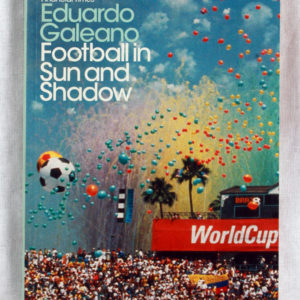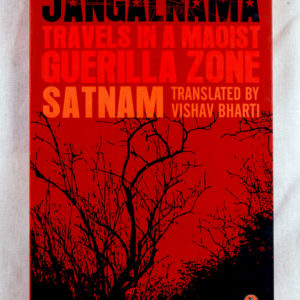The Art of War
₨ 318.00
The Art of War is a book which should be used to gain advantage of opponents in the boardroom and battlefield alike.
- Categories: History, Non-Fiction
- Tags: left books, Sun Tzu, the art of war
Twenty-Five Hundred years ago, Sun Tzu wrote this classic book of military strategy based on Chinese warfare and military thought. Since that time, all levels of military have used the teaching on Sun Tzu to warfare and civilization have adapted these teachings for use in politics, business and everyday life. The Art of War is a book which should be used to gain advantage of opponents in the boardroom and battlefield alike.
Related products
This new edition of Eduardo Galeano’s riveting commentary on the history and politics of soccer includes newly written material on the 2002 World Cup, which one quarter of humanity watched. Discussing everything from the leveling of the Twin Towers to the death of the sole survivor of that extraordinary match between British and German soldiers in 1915, one of South America’s greatest commentators issues forth on robotic soccer in Japan, the mass-production of the game as a sign of the decline of civilization, the amazing success of Senegal and Turkey, and how Nike beat Adidas.
The Art of War, an ancient Chinese text dating from the Spring and Autumn period of the fifth century BC., is a military treatise attributed to the military strategist, Sun Tzu, also called Sunzi. Each of the thirteen chapters discusses a different aspect of warfare and how it applies to military strategy and tactics. For nearly 1,500 years, it was the lead text in an anthology, which in 1080 became known as Seven Military Classics by the Emperor Shenzong of Song.
Publisher : FP
The profound insights offered in Jangalnama are the result of Satnam s close observation of the guerillas and adivasis of Bastar. Varavara Rao Maoist guerillas always on the move, always on guard living deep in the jungles of Bastar. Outlawed, demonized and hunted by the state, they are perceived with fear, incomprehension and terror by the outside world. Satnam spent two months in remarkable intimacy with the guerrillas: travelling with them, sharing their food and shelter, experiencing their lives first hand. Through his up-close and personal account of their daily lives, we register them as human, made of flesh and bone. We are persuaded to appreciate their commitment to root out oppression.
Jangalnama is not merely a travelogue recording Satnam s days in the jungle. It is a compelling argument to recognize the humanity of those in conflict with the mainstream of Indian society and to acknowledge their dream of a world free of exploitation.
Stretcher-Bearer of Empire
In the pantheon of global liberation heroes, Mohandas Karamchand Gandhi has pride of place. Leaders like Mandela have lauded him as being part of the epic battle to defeat the white regime and prepare the way for a non-racial country. A popular sentiment in South Africa goes: ‘India gave us Mohandas, and we returned him to you as Mahatma’.
Against this background, The South African Gandhi: Stretcher-Bearer of Empire unravels the complex story of a man who, throughout his stay on African soil (1893–1914), remained true to Empire while expressing disdain for Africans. For Gandhi, whites and Indians were bound by an Aryan bloodline that had no place for the African. His racism was matched by his class (and caste) prejudice towards the Indian indentured. He persistently claimed that they were ignorant and needed his leadership, and wrote their struggles out of history—struggles this book documents.
The authors show that Gandhi never missed an opportunity to demonstrate his loyalty to Empire, with a particular penchant for war. He served as stretcher-bearer in the war between Brit and Boer, demanded that Indians be allowed to carry fire-arms, and recruited volunteers for the imperial army in both England and India during the First World War.
Ashwin Desai is Professor of Sociology at the University of Johannesburg. His previous books include South Africa: Still Revolting, ‘We are the Poors’: Community Struggles in Post-Apartheid South Africa and Reading Revolution: Shakespeare on Robben Island among others.
Goolam Vahed is Associate Professor of History at the University of KwaZulu Natal. He writes on histories of migration, ethnicity, religion, and identity formation among Indian South Africans.






Reviews
There are no reviews yet.